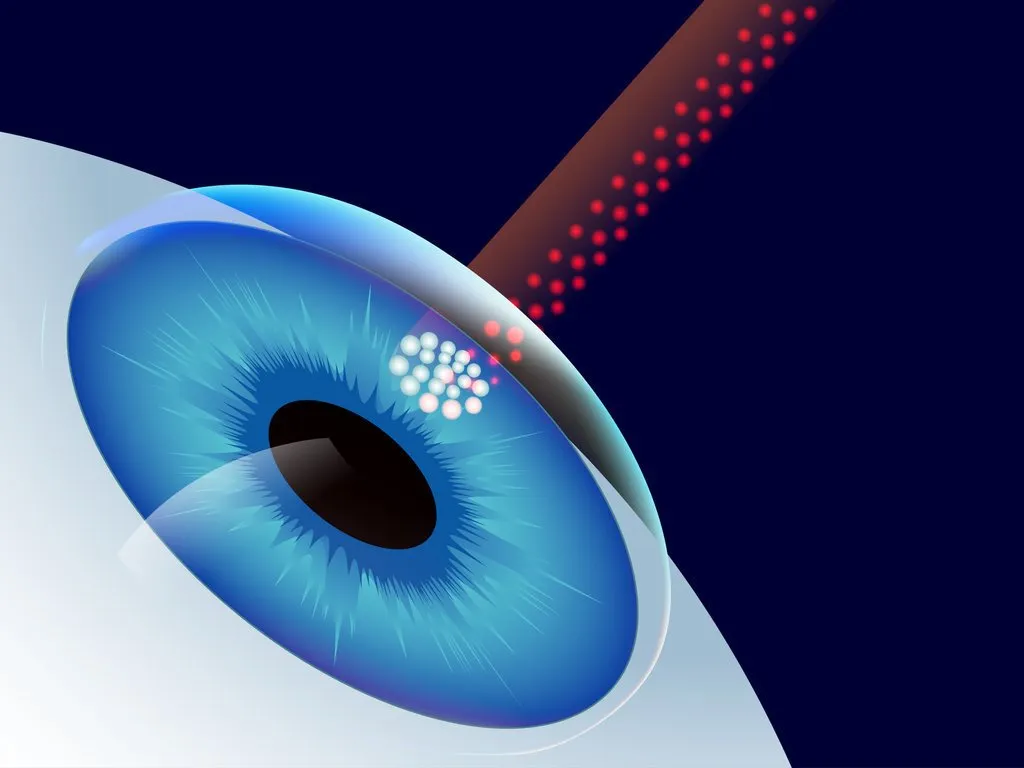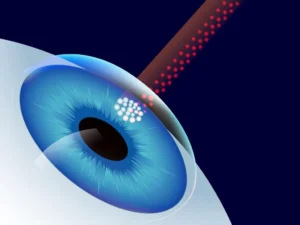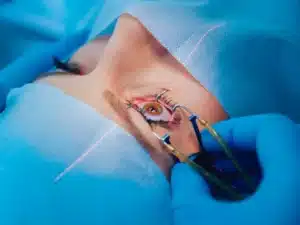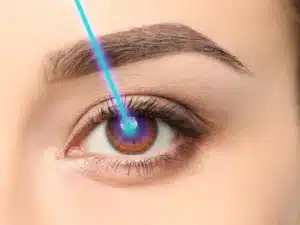A refractive error occurs as a result of an abnormally-shaped eye, which means light isn’t refracting or focusing onto the retina (back of the eye) properly. This results in blurred or distorted vision – sometimes from a distance, sometimes up close, and sometimes both.
The four most common refractive errors include nearsightedness (myopia), farsightedness (hyperopia), astigmatism, and presbyopia. An estimated 157 million people around the world experience vision impairment due to uncorrected refractive errors, not including presbyopia.
Despite being one of the most common causes of vision impairment or vision loss, refractive errors are easy to treat with a variety of treatment options available. For example, more than 64% of adults wear eyeglasses and another 11% of adults wear contact lenses regularly.
What is LASIK Eye Surgery?
With the right prescription, glasses and contact lenses give the patient perfect vision, though it comes at a bit of an inconvenience – so much that some people try their best to avoid them. For those people, alternative options do exist – and LASIK eye surgery is one of the most popular.
Also known as laser-assisted in situ keratomileusis, LASIK surgery has been an FDA-approved treatment for refractive errors since 1999. It’s one of the most popular elective surgeries in the United States and has been performed over 10 million times – roughly 700,000 times per year.
LASIK eye surgery eliminates the need for glasses and/or contact lenses. A laser is used to reshape the cornea and improve vision. Recent studies show that 99% of patients achieve improved vision and over 90% achieve 20/20 vision or better. It’s quick, painless, and rewarding.
How Long Does the LASIK Procedure Take?
Many people expect the LASIK eye procedure to be complex and scary, but that couldn’t be further from the truth. In fact, the surgical procedure takes less than 30 minutes to complete per eye and your doctor can perform both eyes on the same day – oh, and there’s no pain involved!
After applying numbing eye drops, your eye surgeon will make a small incision (corneal flap) before using a laser to reshape the cornea – each pulse of the laser removes a tiny amount of corneal tissue. Once reshaped, light will be able to refract properly and vision will be improved.
The recovery process usually takes one to two months – at which point the eye will have healed fully and vision would’ve stabilized. While you’ll be able to see immediately after surgery, you might not notice an improvement for several weeks. Expect several follow-up appointments.
How Long Does LASIK Eye Surgery Last?
One of the most common questions we get asked by LASIK candidates is – “How long does LASIK last? Are the results temporary or permanent?” The simple answer is that LASIK surgery is a permanent procedure, but there are a few exceptions that might call for correction.
LASIK is permanent in a sense that it can’t be undone and the goal is to never need glasses or contact lenses again. With that said, some people might experience a regression in vision correction over time. In these cases, another surgical procedure can improve vision once again.
In other words, the changes made to the cornea during LASIK surgery are permanent, but it’s still possible to experience vision changes in the future that might call for more surgery. With that said, this is rare and a strong majority of people will see immediate and long-term improvement.
What is LASIK Enhancement Surgery?
Also known as a LASIK touch-up, LASIK enhancement surgery is a follow-up surgery for those that aren’t impressed with their initial results or have seen a regression in vision correction. It’s an attractive option for those that had LASIK, but have since returned to wearing eyeglasses.
Most people that need enhancement will end up getting it five to ten years after their initial surgery. The good news is that it’s extremely rare for someone to need LASIK enhancement surgery – especially as technology continues to grow more accurate, advanced, and safe.
When Should You See Your Eye Doctor?
In general, everyone should be visiting their eye doctor at least once per year – unless directed otherwise. This gives your eye doctor an opportunity to monitor and analyze your eye health over a long period of time – ultimately putting your vision and eye health in a position to succeed.
For those with a refractive error, glasses and contact lenses are a viable and affordable option. For others, LASIK eye surgery might be a much more attractive option. Of course, not everyone is a candidate for LASIK – here’s what your doctor might look for before recommending LASIK:
- Are you over the age of 18 years old?
- Do you have any major health conditions that could complicate the procedure?
- Are you in good overall health?
- Are your eyes healthy and free of any vision problems?
- Is your cornea thick enough?
- Does your refractive error impact your ability to see clearly?
If you answered yes to the above questions, then you might be a candidate for LASIK eye surgery. Your ophthalmologist will better analyze your eye health to ensure you’re a good candidate. Once approved, LASIK patients schedule a date with their eye doctor and they’ll be good to go!
The laser vision correction procedure is a quick, painless, and highly-successful procedure that relieves millions of people of their blurred vision. Not having to wear your glasses or contact lenses anymore is 100% worth the investment and most patients experience an improved quality of life as a result.
If you’re interested in learning more about refractive surgery, want to see if you’re a good candidate for LASIK surgery, or have any other questions regarding your eye health, don’t hesitate to contact an Eye Doctor Milwaukee for immediate assistance – we’re just one phone call away!
Our friendly and experienced staff will be here to guide you through the process and will stay dedicated to ensuring you receive the best eye care possible. We’re attentive, committed, and proud of the work we do on a daily basis and can’t wait to extend that to you and your family!





